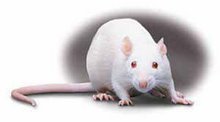
February is Black History Month. To celebrate this, I am going to feature an African American Scientist every Thursday this month.
My first choice is probably the most historically famous: George Washington Carver, a chemist, food scientist, botanist, and agriculturist.
Here is the Wikipedia biography:
http://en.wikipedia.org/wiki/George_Washington_Carver
Carver was born into slavery in what is now known as Diamond,
Because of his race, George met with difficulties in attending grade school, but didn't let that stop him from a good education. As Carver is quoted, "Education is the key to unlock the golden door of freedom." He moved from school to school, eventually graduating high school in
Carver also faced the same difficulty getting accepted into colleges, but was eventually successful. He started as the second African-American to attend
If you've ever heard of George Washington Carver, chances are the things you took away from the lesson were that Carver was an early Black scientist and that he invented all sorts of wonderful and exotic uses for the lowly peanut. Why peanuts? Because all the cotton farming down South had depleted nitrogen from the fields. Peanuts and other legumes replenished the nitrogen, so Carver encouraged farmers to plant them. But there were only so many uses for the plant (salted peanuts, anyone?). So to help all those farmers that had planted a nearly unmarketable crop, he invented lots of recipes and products for them and helped market them.
What was he reputed to have invented? Carver developed between one-hundred and three-hundred applications for peanuts and 118 for sweet potatoes, (http://www.npg.si.edu/edu/brush/guide/unit2/carver.html) including bleach, metal polish, paper, plastic, glue for postage stamps, printer's ink, plant milk, cooking oils, flour, instant coffee, mayonnaise, meat tenderizer, cheese, dyes, shaving cream, shoe polish, synthetic rubber, talcum powder, wood stains, varnish, soap, vinegar and cooking sauces. He made similar investigations into uses for cowpeas, soybeans and pecans. Also he authored three patents (one for cosmetics, and two for paints and stains). Now, I'd like to know exactly how a frickin' peanut can be turned into some of these products, but apparently he made it happen – and therein lies his talent. He also invented a form of peanut butter, but don't start thinking Jiff or Peter Pan peanut butter. It was more like the oily, gritty, unsugared organic sh*t you get at health stores. My wife buys that stuff to feed to our kids. I refuse to eat it. But apparently his was good enough to launch the invention.
Unfortunately, Carver was not a model scientist in terms of his practice. For one thing, he didn't keep a lab book, and kept all his recipes in his head, refusing to write them down. That means almost none of his inventions can be repeated and are therefore lost to time. Pretty sad. He wouldn't write down lists of inventions, either, which is why there is confusion about exactly how many he came up with. He also claimed God gave him his ideas for plant products. He hated teaching and was very bad at administrative work, preferring to dedicate himself to research (which he was eventually able to do). He had his own 2-room lab, much to the jealousy of other faculty, and lived (get this!) on the second floor of a woman's dormitory, accessing his room via a fire escape. He partnered with presidents and captains of industry to develop a number of novel uses, but almost never sought to capitalize off of his endeavors, often giving his advice and expertise freely. No one can say exactly how many of our plant-derived products came from his inspiration.
Carver died at age 76 after a fall down some stairs. He willed his entire savings to



No comments:
Post a Comment